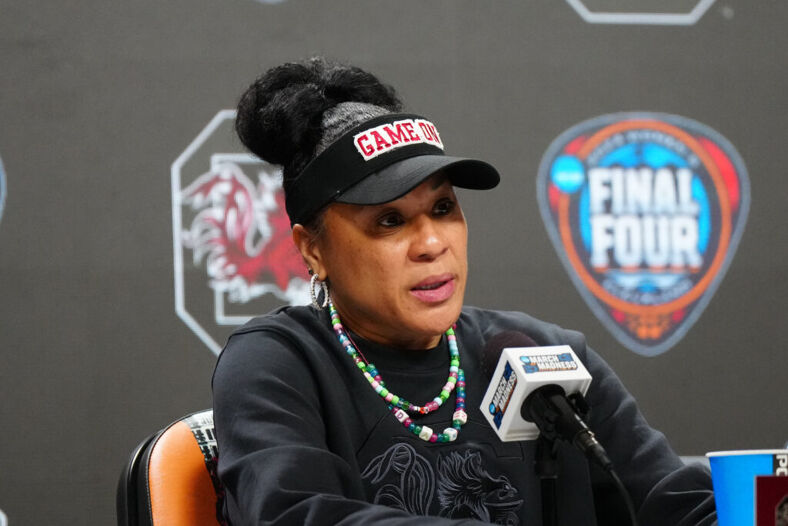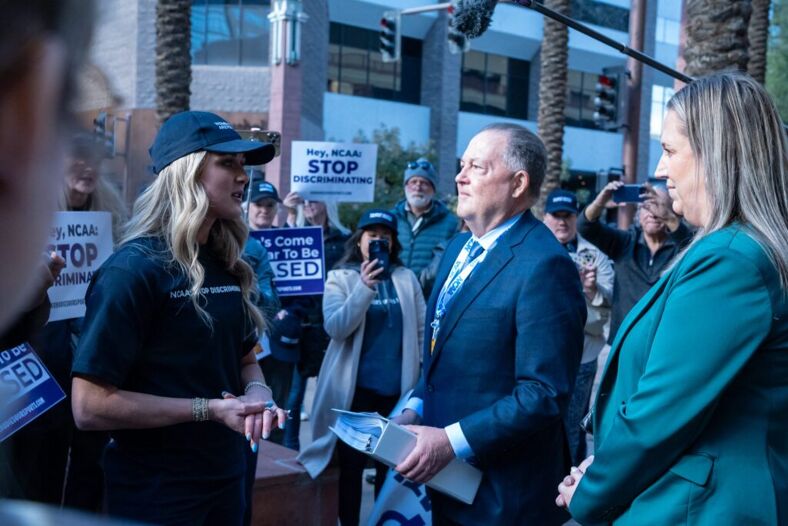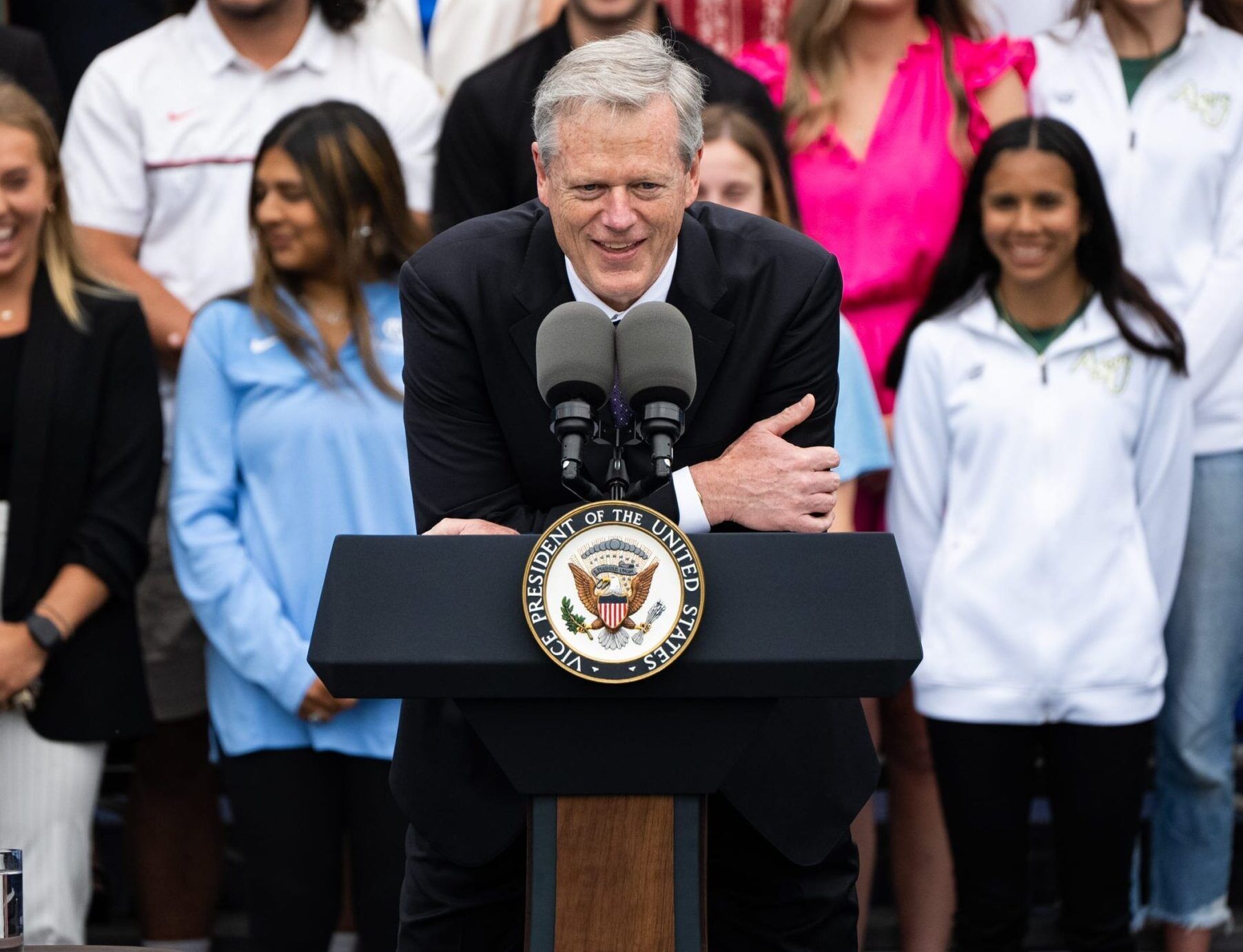The NCAA Board of Governors met in a virtual sessions Thursday. One of the topics at the front of the list was continued attempts at NIL (Name-Image-Likeness) regulations and reforms, and best practices guidelines for mental health.
There is also a growing urgency on the matter of transgender athletes in the NCAA, even with enhanced regulation ahead in the coming academic year. That urgency has been accelerated by the efforts of certain groups seeking a total ban on transgender women competing in women’s collegiate sport, as well as groups pushing for the inclusion of trans women in the female category.
A ban has been the main thrust of a coalition of groups backed by a number of anti-transgender interests, including the Independent Council on Women’s Sports (ICONS). This effort lead to the filing of a lawsuit against the NCAA March 14 by 16 former and current NCAA athletes including former University of Kentucky swimmer-turned anti-trans activist Riley Gaines.
The NCAA’s deliberation also comes amidst the ban put in place by the National Association of Intercollegiate Athletics on April 9. Officials for the organization, made up of mainly smaller private and religiously affiliated schools, cited equity and fairness concerns for the reason behind the decision. The only out trans student-athletes to compete in NAIA history of which Outsports is aware where both transgender men.
Get off the sidelines and into the game
Our weekly newsletter is packed with everything from locker room chatter to pressing LGBTQ sports issues.
Trans allies and pro-trans-inclusion organizations criticized the NAIA’s move.
“This ruling is devastating,” former Harvard swimmer and advocate Schuyler Bailar noted via Instagram. “It was based on massive political pressure.” He continued that this is “currently being waged against trans people and specifically transgender athletes.”

People seeking trans-inclusive policies are hoping the recent basketball Women’s Final Four boomlet, including the supportive words of South Carolina’s national champion head coach Dawn Staley, will forge a pushback against a wave of transphobic policy and legislation. Amid this debate are 23 states that have passed trans student-athlete bans at various levels of sports.
There is also the matter of where “science” and “medicine” fall on the issue. An IOC-funded study published April 12, the first to use transgender athletes across the board, warns against blanket bans that ICONS and others are seeking.
Such hopes powered a P.R. counter initiative this week. Over 400 former and current collegiate and professional athletes, 300 scholars and researchers, and 100 LGBTQ-rights organizations all sent letters to the NCAA’s Board of Governors demanding the NCAA “ensure that the lifesaving power of sport is accessible to all athletes who compete in championship and emerging sports at and for NCAA-member institutions – including transgender athletes.”
Neither anti-trans efforts like ICONS, nor pro-inclusion organizations such as Athlete Ally, agree with the NCAA policy phase that starts in August 2024. In this new framework, each NCAA sport will cede to the policies set by either their respective national or world governing bodies to decide the eligibility of transgender women.

People supporting a ban on trans woman in female sports are calling for the NCAA to enact inclusive policy immediately and not wait on governing bodies. To quote the filing of the NCAA lawsuit: “The NCAA imposed a radical anti-woman agenda on college sports. Reinterpreting Title IX to define women as a testosterone level, permitting men to compete on women’s teams, and destroying female safe spaces in women’s locker rooms.”
Advocates for inclusion cite that the NCAA’s current regulations, which still allow trans women to compete in women’s athletics in all sports, should remain. They say that the next phase of the currently proposed NCAA policy would open up those trans student-athletes to total bans.
Next season, for example, transgender women would be banned from the female category in NCAA swimming and NCAA track and field because those respective world governing bodies instituted such bans.
In the middle of this controversy sits NCAA President Charlie Baker. Since taking his leadership position at the NCAA last March, he has seemed reticent to publicly say anything definitive on the issue, one way or the other.
As a two-term Republican Governor of Massachusetts, Baker signed trans rights protection into law. His actions were in stark contrast to many state and federal GOP legislators seeking to reverse those protections.
From appearances, the NCAA seems content to stand on their current and impending policy. The question at hand: How much will public pressure for a trans-athlete ban affect the NCAA? Anti-trans figures like Gaines have been visible at some of the NCAA’s biggest women’s championship events. They show no signs of abatement.
The NCAA stayed on their course for now, but the winds of discontent over the policy are growing more intense.

























